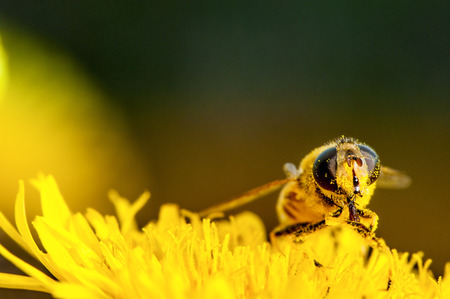Crop Chemical Leaves Bees Susceptible to Viruses
January 25, 2017
Bee Colony Collapse, Honey News, Honey Bees
A chemical that has widely been considered safe and used on various crops has been discovered to make honeybees susceptible to a deadly virus, as per researchers at Penn State and the U.S. Department of Agriculture. "In the lab, we found that the commonly used organosilicone adjuvant, Sylgard 309, negatively impacts the health of honeybee larvae by increasing their susceptibility to a common bee pathogen, the Black Queen Cell Virus," said Julia Fine, a Penn State graduate student in entomology.
"These results mirror the symptoms observed in hives following almond pollination when bees are exposed to organosilicone adjuvant residues in pollen, and viral pathogen prevalence is known to increase. In recent years, beekeepers have reported missing, dead, and dying brood in their hives following almond pollination, and exposure to agrochemicals, like adjuvants, applied during bloom has been suggested as a cause," Fine continued.
According to Chris Mullin, a Penn State entomology professor, adjuvants in general greatly improve the efficacy of pesticides by enhancing their toxicities. "Organosilicone adjuvants are the most potent adjuvants available to growers," he said. "Based on the California Department of Pesticide Regulation data for agrochemical applications to almonds, there has been increasing use of organosilicone adjuvants during crop blooming periods---when two-thirds of the U.S. honeybee colonies are present."
The EPA has referred to organosilicone adjuvants as biologically inert or as unable to cause a reaction in living things. "As a result," Fine says, "there are no federally regulated restrictions on their use." To conduct their study, researchers reared honeybee larvae under controlled conditions. "We found that bees exposed to the organosilicone adjuvant had higher levels of Black Queen Cell Virus," said Fine. "Not only that, when they were exposed to the virus and the organosilicone adjuvant simultaneously…the mortality was higher from the simultaneous application of adjuvant and virus than from exposure to either the organosilicone adjuvant or the viral pathogen alone, even if those two mortalities were added together. This suggests that the adjuvant is enhancing the damaging effects of the virus."
Researchers also found that a particular gene involved in immunity (called 18-wheeler) had reduced expression in bees treated with the adjuvant and the virus compared to bees in the control groups. "Taken together, these findings suggest that exposure to organosilicone adjuvants negatively influences immunity in honeybee larvae, resulting in enhanced pathogenicity and mortality," Fine said.
Mullin noted the team’s result suggests that recent U.S. honeybee decline may be related to increased use of organosilicone adjuvants. "Billions of pounds of formulation and tank adjuvants, including organosilicone adjuvants, are released into U.S. environments each year, making them an important component of the chemical landscape to which bees are exposed," he said. "We now know that at least Sylgard 309, when combined at a field-relevant concentration with Black Queen Cell Virus, causes synergistic mortality in honeybee larvae."
Copyright: kosmos111 / 123RF Stock Photo


.jpg)




